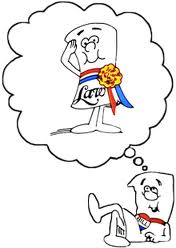by Emily Hamstra
I always look forward to this time of year for many reasons–spending time with family and friends over the holidays, the end of a busy semester is approaching, and of course, lists and awards galore. I was delighted by this year’s National Book Award winners. Yesterday, The New York Times released the 100 Notable Books of 2012.
As you scour your favorite lists and anticipate your favorite award winners this year, I want to remind you to add RUSA’s lists and awards to your list of lists and award to watch. The RUSA awards are given out yearly to honor outstanding librarians, stellar books, and forward thinking publishers and editors. The RUSA awards are something that I look forward to. I always find the winners inspiring and encouraging, and I learn about exciting resources through the awardees.
The nominations for the RUSA awards are due December 15th. There certainly isn’t better way to honor your colleagues, someone who inspires you, or your favorite resource than by putting forward an award nomination! Do you know of a library or librarian who has developed a resource or guide to literature to meet the unique needs of patrons? If so, consider recommending them for the Gale Cengage Learning Award for Excellence in Reference and Adult Library Services Award. The winner of this award will receive $3,000. Where do you go to find a good book review? Do you have a favorite book reviewer or book blog you follow? If so, consider nominating an outstanding book reviewer, book review medium, or an organization for the Louis Shores Award. The winner will be recognized at the RUSA Awards Ceremony at the ALA Midwinter Conference. There are too many awards to mention them all, so read about all the awards on the RUSA Awards website.

